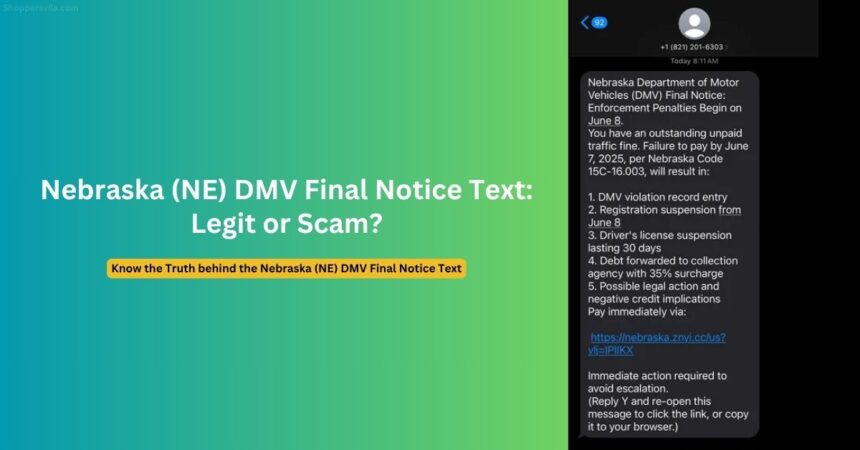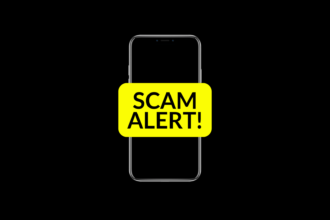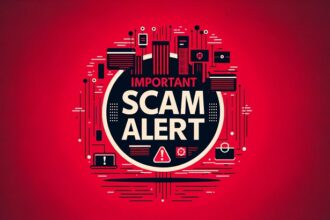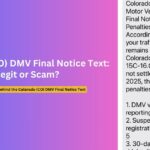A sophisticated text message scam impersonating the Nebraska Department of Motor Vehicles has swept across the state, targeting thousands of residents with fake “final notice” messages about unpaid traffic fines. The Nebraska State Patrol, DMV, and Lincoln Police have issued urgent warnings as reports flood in from communities across Nebraska about this coordinated phishing attack.
Overview of the Nebraska (NE) DMV Text Scam
The Nebraska DMV Final Notice Text Scam represents one of the most widespread phishing attacks to hit the state in recent years. On June 7-8, 2025, thousands of Nebraskans received nearly identical text messages claiming to be official notices from the Nebraska Department of Motor Vehicles about outstanding traffic violations.
DMV Director Rhonda Lamm stated unequivocally: “None of these text messages are legitimate. The Nebraska DMV does not send any such official notice via text message.”
The scam’s sophistication lies in its official-sounding language, threatening consequences, and time-sensitive demands designed to bypass recipients’ critical thinking. Scammers are attempting to steal personal and financial information by directing victims to fraudulent payment websites that closely mimic legitimate government portals.
Scale of the Attack
Reports indicate this Nebraska DMV traffic tickets text scam has affected:
- Multiple counties across Nebraska
- Residents who haven’t received tickets in years
- People who don’t even own vehicles or have driver’s licenses
- Individuals living outside Nebraska but with Nebraska phone numbers
How the DMV Final Notice / Outstanding Traffic Ticket Scam Works
The Nebraska department of motor vehicles outstanding traffic ticket text scam follows a calculated psychological manipulation strategy:
1. Mass Distribution Phase
Scammers send bulk text messages to phone numbers, often targeting area codes associated with Nebraska (402, 531) but also sending to out-of-state numbers from people who previously lived in Nebraska.
2. Fear Induction
The message creates immediate panic by claiming:
- Outstanding unpaid fines exist
- Immediate payment is required
- Severe consequences await (license suspension, legal action)
- Time is running out (usually 24-48 hours)
3. Urgency Creation
By setting tight deadlines and threatening escalating penalties, scammers hope to pressure victims into acting quickly without verification.
4. Information Harvesting
Victims who click the malicious link are directed to fake websites designed to capture:
- Credit card information
- Social Security numbers
- Driver’s license numbers
- Banking details
- Personal identifying information
Fake Text Message Patterns and Examples
Typical Fake Nebraska DMV Final Notice Text Example:
Nebraska Department of Motor Vehicles (DMV) Final Notice:
Enforcement Penalties Begin on June 8.
You have an outstanding unpaid traffic fine. Failure to pay by
June 7, 2025, per Nebraska Code 15C-16.003, will result in:
1. DMV violation record entry
2. Registration suspension from June 8
3. Driver’s license suspension lasting 30 days
4. Debt forwarded to collection agency with 35% surcharge
5. Possible legal action and negative credit implications
Pay immediately via:
[MALICIOUS LINK]
Immediate action required to avoid escalation.
(Reply Y and re-open this message to click the link, or copy
it to your browser.)
Common Variations Include:
- Different fine amounts ($50-$500)
- Various deadline dates
- References to toll violations (despite Nebraska having limited toll roads)
- Mentions of parking violations
- Claims about federal administrative codes
Critical Red Flags to Identify the Scam
Phone Number Red Flags:
- +63 country code (Philippines)
- 571 area code (Northern Virginia)
- 817 area code (Texas)
- Non-Nebraska area codes for official state business
- International dialing codes
Content Red Flags:
- Fake legal citations: “Nebraska Code 15C-16.003” doesn’t exist (Nebraska uses Revised Statutes)
- No personal details: Real notices include your name, violation details, date, location
- Generic threats: Actual DMV notices are specific about violations
- Immediate payment demands: Government agencies provide grace periods and appeal processes
Technical Red Flags:
- Suspicious URLs: Links containing “.asia” domains instead of “.gov”
- Non-functional website elements: Only payment buttons work on fake sites
- Poor grammar/formatting: Official communications are professionally written
- Unusual reply instructions: “Reply Y and re-open message” is not standard practice
Behavioral Red Flags:
- Unsolicited nature: You didn’t sign up for DMV text alerts
- Weekend timing: Government agencies rarely issue urgent notices on weekends
- Mass timing: Multiple people receiving identical messages simultaneously
How to Protect Yourself from Fraudulent Nebraska DMV Final Notice Texts
Immediate Protection Steps:
- Never Click Suspicious Links
- Do not click any links in unsolicited texts
- Avoid downloading attachments from unknown sources
- Don’t reply to suspicious messages
- Verify Independently
- Contact the Nebraska DMV directly at (402) 471-3861
- Visit the official website: dmv.nebraska.gov
- Check your driving record through official channels
- Secure Your Information
- Don’t provide personal information via text or email
- Use strong, unique passwords for online accounts
- Enable two-factor authentication where available
Advanced Protection Strategies:
For Phone Security:
- Enable spam filtering on your device
- Report suspicious numbers to your carrier
- Consider call-blocking apps
- Be cautious about sharing your phone number online
For Financial Security:
- Monitor bank and credit card statements regularly
- Set up account alerts for transactions
- Freeze your credit if concerned about identity theft
- Use secure payment methods for legitimate transactions
What to Do If You Receive the Scam Text
Immediate Actions:
- Do Not Engage
- Don’t click links
- Don’t reply to the message
- Don’t call numbers provided in the text
- Report the Scam
- Forward the text to 7726 (Federal Trade Commission)
- Report to the FBI Internet Crime Complaint Center
- Contact Nebraska State Patrol: (402) 471-4545
- File a complaint with the Federal Trade Commission at reportfraud.ftc.gov
- Delete and Block
- Mark the message as spam/junk
- Block the sender’s number
- Delete the message completely
If You Already Clicked or Provided Information:
Immediate Steps:
- Contact your bank and credit card companies immediately
- Cancel affected payment cards
- Change passwords for online accounts
- Monitor credit reports closely
Follow-up Actions:
- Consider placing a fraud alert with credit bureaus
- File a police report if you suffered financial loss
- Document all communications related to the scam
- Report the incident to your insurance company if applicable
Statewide Campaign: Cities Affected Across Nebraska
Major Metropolitan Areas Hit by the Scam:
The Nebraska DMV Final Notice Text Scam has been reported across every major city and town in the state, including:
Eastern Nebraska:
- Omaha residents received hundreds of reports
- Lincoln police issued specific warnings to citizens
- Bellevue and Papillion residents targeted extensively
- Fremont and Blair communities affected
- Nebraska City and Plattsmouth reports confirmed
Central Nebraska:
- Grand Island residents reported multiple scam attempts
- Kearney and Hastings saw significant activity
- Columbus and Lexington communities targeted
- York and Seward residents affected
- Aurora and Central City reports confirmed
Western Nebraska:
- North Platte residents received numerous scam texts
- Scottsbluff and Gering communities targeted
- Alliance and Chadron residents affected
- Sidney and Ogallala reports confirmed
- Kimball and Banner County residents targeted
Northern Nebraska:
- Norfolk residents reported extensive scam activity
- Columbus and Albion communities affected
- O’Neill and Ainsworth residents targeted
- Valentine and Bassett reports confirmed
- Winner and Broken Bow areas affected
Southern Nebraska:
- Beatrice residents received multiple scam attempts
- McCook and Imperial communities targeted
- Falls City and Auburn residents affected
- Hebron and Superior reports confirmed
- Red Cloud and Alma areas targeted
Frequently Asked Questions (FAQs)
1. Is the Nebraska DMV Final Notice or Outstanding Traffic Ticket Text Legit?
No, absolutely not. DMV Director Rhonda Lamm has confirmed that “The Nebraska DMV does not send any such official notice via text message.” All text messages claiming to be from the Nebraska DMV about unpaid fines are scams. Legitimate DMV communications come through official mail or through your registered online account.
2. What is Nebraska Administrative Code 15C-16.003?
This code does not exist. The text messages reference “Nebraska Code 15C-16.003,” but this is completely fabricated. Nebraska uses a “Revised Statutes” system, with citations formatted as “Neb. Rev. Stat. §XX-XXX.” Any message citing this fake code is automatically a scam.
3. How Do I Pay Real Nebraska DMV Tickets?
Legitimate Nebraska DMV ticket payments can only be made through:
- Official Nebraska DMV website: dmv.nebraska.gov
- In-person at DMV offices
- By mail using the payment stub from your official citation
- Through court systems for traffic violations
- Never through unsolicited text message links
4. Does Nebraska DMV Send Text Messages?
The Nebraska DMV does not send unsolicited text messages about fines or violations. While some government agencies may send appointment reminders or service updates to users who specifically opt in, the DMV does not use text messaging for enforcement notices, payment demands, or violation notifications.
5. What Should I Do If I Already Paid Through the Scam Link?
Take immediate action:
- Contact your bank/credit card company immediately to report fraud
- Cancel the payment method used
- File a police report
- Report to the FTC at reportfraud.ftc.gov
- Monitor your accounts for unauthorized activity
- Consider placing a fraud alert on your credit reports
Staying Safe: Prevention Tips
General Scam Prevention:
- Government agencies communicate through official mail, not text
- Verify any urgent claims by contacting agencies directly
- Never provide personal information through unsolicited communications
- Be skeptical of threats and artificial urgency
- When in doubt, hang up, delete, or walk away
Technology Best Practices:
- Keep your devices updated with latest security patches
- Use reputable antivirus software
- Enable automatic security updates
- Be cautious about public Wi-Fi for sensitive activities
- Regularly review and update privacy settings
Conclusion
The Nebraska DMV Final Notice Text Scam represents a serious threat to residents across the state, from Omaha to Scottsbluff, and from Norfolk to McCook. By understanding the red flags, knowing how to respond, and staying informed about current threats, Nebraskans can protect themselves and their communities from these sophisticated phishing attacks.
Remember: legitimate government agencies will never demand immediate payment through unsolicited text messages. When in doubt, always verify through official channels. If you receive suspicious communications, report them immediately to help protect others in your community.
Stay informed about the latest scam alerts and consumer protection tips with ShoppersVila.com – your trusted source for safety information and smart consumer guidance.



































